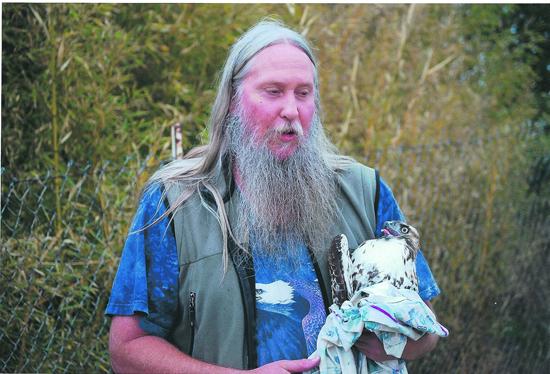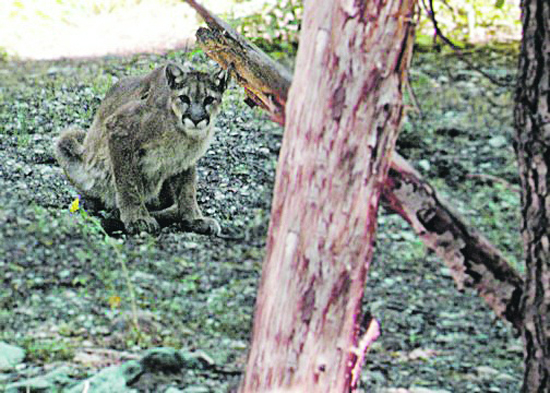 | | | Doc Hale Photos provided
| | | | | | Longtime wildlife biologist, naturalist, and ethnobiologist James 'Doc' Hale understands the Lafayette area, its natural beauty, the wildlife that lives there, and the history of the Native Americans who once built villages along its creek and tributaries. He will discuss these Native Americans, and the edible plants they used for sustenance and medication, on July 13 at the Lafayette Community Garden and Outdoor Learning Center.
 "The phrase that's carved in our garden's gate is Rachel Carson's 'In Nature Nothing Exists Alone,'" says Lafayette Community Garden's Beth Ferree. "Gardening is only one of the components of what we are about; the other two are education and preservation." Hale's class is part of the garden's mission to promote a better appreciation and use of our land.
"The phrase that's carved in our garden's gate is Rachel Carson's 'In Nature Nothing Exists Alone,'" says Lafayette Community Garden's Beth Ferree. "Gardening is only one of the components of what we are about; the other two are education and preservation." Hale's class is part of the garden's mission to promote a better appreciation and use of our land.
 The idea originated during one of the interpretive cultural and natural history hikes Hale leads in the Morgan Territory Regional Preserve with members of the garden. "I knew this park before," says Ferree, "but I had no idea about the richness of Indian heritage sites it contains."
The idea originated during one of the interpretive cultural and natural history hikes Hale leads in the Morgan Territory Regional Preserve with members of the garden. "I knew this park before," says Ferree, "but I had no idea about the richness of Indian heritage sites it contains."
 The mountain lion expert and former UC Santa Cruz professor, whose current research involves Native American cultural sites in the Bay Area, used to take his students backpacking for an entire semester to teach them about natural and cultural history, Sierra Nevada ecology, wildlife biology, botany, and field study. Hale says that the East Bay was the most densely populated Native American region in North America. "The density here was up to 16 habitants per square mile," he says. "When the Spaniards came, in a span of 40 years they were mostly wiped out."
The mountain lion expert and former UC Santa Cruz professor, whose current research involves Native American cultural sites in the Bay Area, used to take his students backpacking for an entire semester to teach them about natural and cultural history, Sierra Nevada ecology, wildlife biology, botany, and field study. Hale says that the East Bay was the most densely populated Native American region in North America. "The density here was up to 16 habitants per square mile," he says. "When the Spaniards came, in a span of 40 years they were mostly wiped out."
 Hale says that Lafayette is the location of many Saklan village sites: "There are at least 15 different sites I know of near creeks and tributaries along the Lafayette corridor," he says. Today most of them have been built over.
Hale says that Lafayette is the location of many Saklan village sites: "There are at least 15 different sites I know of near creeks and tributaries along the Lafayette corridor," he says. Today most of them have been built over.
 "The population here was flourishing because the vegetation and wildlife were very abundant," he notes. Hale explains that before ranchers replaced native grass with annual vegetation for their cattle, the hills were covered with much heartier plants. "The Indians knew how to manage the land with controlled fires, and they knew how to feed on the abundance of native plants available," he says.
"The population here was flourishing because the vegetation and wildlife were very abundant," he notes. Hale explains that before ranchers replaced native grass with annual vegetation for their cattle, the hills were covered with much heartier plants. "The Indians knew how to manage the land with controlled fires, and they knew how to feed on the abundance of native plants available," he says.
 During the class at the garden, Hale will describe how to identify edible plants and medicinal plants, and will take participants along the creek to discuss the Saklan civilization.
During the class at the garden, Hale will describe how to identify edible plants and medicinal plants, and will take participants along the creek to discuss the Saklan civilization.
 In addition to offering tours and classes, since he retired from his teaching position, Hale has become a local activist for the restoration of our wild environment. He believes that even if our population grows, there are smart ways to manage the suburban/open space interface to protect wildlife. He has been working with the Walnut Creek watershed on the restoration of salmon in the streams with great success. He is also working with the Muir Land Trust for the preservation of the routes of local mountain lions.
In addition to offering tours and classes, since he retired from his teaching position, Hale has become a local activist for the restoration of our wild environment. He believes that even if our population grows, there are smart ways to manage the suburban/open space interface to protect wildlife. He has been working with the Walnut Creek watershed on the restoration of salmon in the streams with great success. He is also working with the Muir Land Trust for the preservation of the routes of local mountain lions.
 "They are no threat to us," he says, noting that since 1890 there have been only seven human deaths caused by mountain lions. "They are programmed to feed on deer and they travel at night. The problem is that freeways have cut their routes, but it seems that they are using creeks and ridges to move about." Hale, who was born and raised in Lafayette in the pre-freeway era, has a special respect for the lions; he has had eight sightings of mountain lions in his lifetime.
"They are no threat to us," he says, noting that since 1890 there have been only seven human deaths caused by mountain lions. "They are programmed to feed on deer and they travel at night. The problem is that freeways have cut their routes, but it seems that they are using creeks and ridges to move about." Hale, who was born and raised in Lafayette in the pre-freeway era, has a special respect for the lions; he has had eight sightings of mountain lions in his lifetime.
 While Hale is not scheduled to discuss wildlife in detail while at the garden, he will respond if asked. His main goal, however, is to encourage people to restore the natural habitat of their surroundings. "We still have the seed bank of the native plants and grasses that were here," he says. "People can harvest wild seeds and propagate in their own garden. There are also nurseries around that provide them."
While Hale is not scheduled to discuss wildlife in detail while at the garden, he will respond if asked. His main goal, however, is to encourage people to restore the natural habitat of their surroundings. "We still have the seed bank of the native plants and grasses that were here," he says. "People can harvest wild seeds and propagate in their own garden. There are also nurseries around that provide them."
 Hale will speak at 3:30 p.m. Saturday, July 13 as part of the outdoor classes offered at the Lafayette Community Garden. For more information about future classes or to register, visit lafayettecommunitygarden.org/
Hale will speak at 3:30 p.m. Saturday, July 13 as part of the outdoor classes offered at the Lafayette Community Garden. For more information about future classes or to register, visit lafayettecommunitygarden.org/
 sign-up-for-events.
sign-up-for-events.

|

